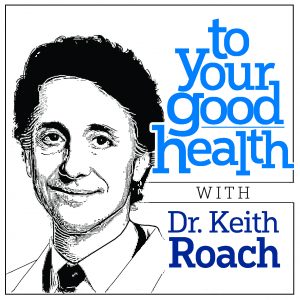TO YOUR GOOD HEALTH: COPD lung function can’t be restored
By Dr. Keith Roach — November 9, 2021 DEAR DR. ROACH: I read your recent column on pulmonary fibrosis. I especially appreciate knowing that there are medications known to slow the progression of lung disease, reduce exacerbations and reduce mortality. With a 20-year-old diagnosis of COPD and having been prescribed medications to reduce exacerbations, you might imagine my interest in your article.
DEAR DR. ROACH: I read your recent column on pulmonary fibrosis. I especially appreciate knowing that there are medications known to slow the progression of lung disease, reduce exacerbations and reduce mortality. With a 20-year-old diagnosis of COPD and having been prescribed medications to reduce exacerbations, you might imagine my interest in your article.
I’m wondering how pulmonary fibrosis differs from COPD and if the two medications that you mention (pirfenidone and nintedanib) might be helpful in slowing the progression of lung disease in patients such as myself. Have any studies been completed using these medications on patients with COPD? — S.A.
ANSWER: Chronic obstructive pulmonary disease — its two main forms are emphysema and chronic bronchitis — usually, but not invariably, is a result of long-term exposure to lung toxins, especially smoke. In the most common case of COPD, due to cigarette smoking (at least, that’s the most common in North America and Europe: cooking fires are still a common cause in less developed countries), stopping the exposure will dramatically slow down further damage. Unfortunately, there are no established treatments that can restore lung function in people with moderate to advanced COPD.
Pulmonary fibrosis is, by contrast, a rare disease; about 30,000 people in the U.S. are diagnosed each year (compare that with the 9 million people in the U.S. diagnosed with chronic bronchitis last year).
The exact mechanism of action of pirfenidone and nintedanib is not known, but they are not thought to be effective in COPD. Surprisingly, I did not find a published trial looking at whether these drugs might be effective. The need for new therapies to treat COPD is so great that I would have thought some researcher might have tried it, despite the long odds.
***
DEAR DR. ROACH: At 75, I had my first-ever kidney stone in December. The urologist told me to stop drinking so much milk. But he never asked if my diet had changed. I had been eating almonds by the handful every day. I felt certain this was the cause of the stone.
I drink skim milk, which is practically tasteless. I started adding a slight bit of almond milk to the skim to give it a more pleasant taste. Should I not be doing this? — P.T.
ANSWER: I am not certain why the urologist told you to stop drinking cow’s milk. We used to believe that the calcium in milk increased risk for kidney stones, especially calcium oxalate stones, which are the most common type; however, dietary calcium paradoxically decreases risk of kidney stones, whereas calcium supplements increase risk of stones. What makes the biggest difference in diet is the oxalate content.
Almonds, as well as almond milk, are very high in oxalate; cow’s milk is not. I don’t know what you mean by a “slight bit” of almond milk, but I would try to avoid taking too much (more than a few teaspoons a day), and find another way to flavor the milk if you really don’t like it. I know a few people who add a drop of vanilla. Coconut milk — which I don’t recommend consuming in large quantities due to the saturated fat content — does not have oxalate.
Essentially, everybody with kidney stones should drink plenty of water, and nearly everyone should be very careful not to have too much sodium.
***
Dr. Roach regrets that he is unable to answer individual questions, but will incorporate them in the column whenever possible. Readers may email questions to ToYourGoodHealth@med.cornell.edu.
© 2021 North America Synd., Inc.
All Rights Reserved







